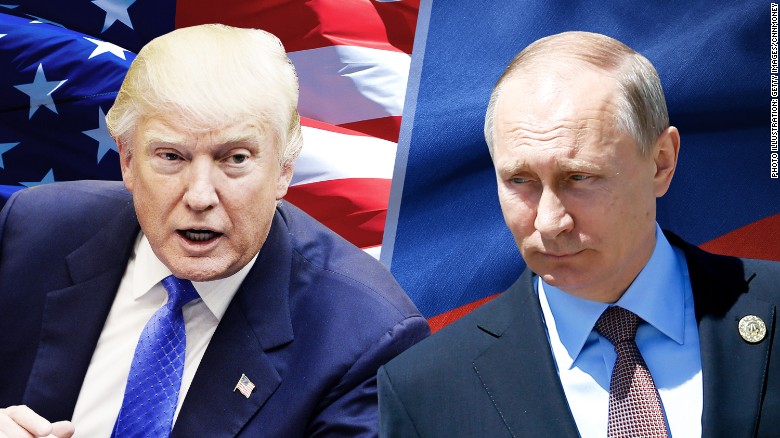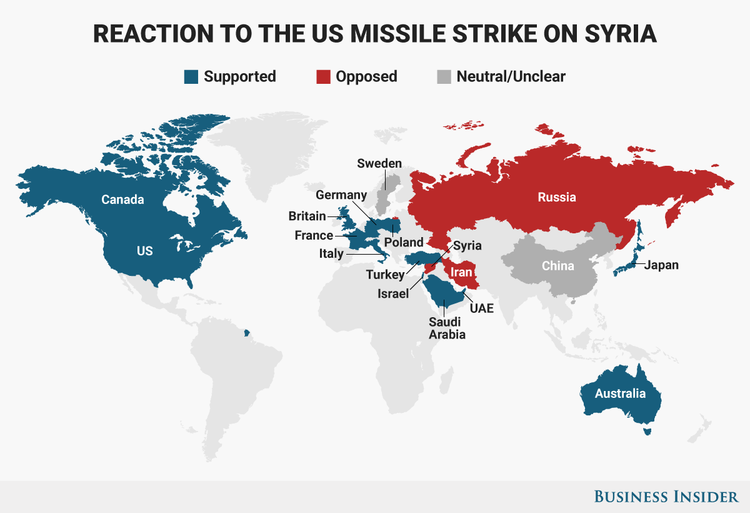- GOLD IRA
- Download Our 2024 Precious Metals IRA Investor’s Guide.
Click Here  Gold IRA
Gold IRA
 Investing
Investing
-
- CRYPTO IRA
- PRICES & STATS
- RETIREMENT PLANS
- BLOG
 Questions? Call (888) 820 1042
Questions? Call (888) 820 1042
Relations Between the U.S. and Russia Have Never Been Worse
Disclosure: Our content does not constitute financial advice. Speak to your financial advisor. We may earn money from companies reviewed. Learn more
Last Updated on: 25th December 2020, 06:08 am

Last week, you saw U.S. and Russian relations hit a new post-Cold War low. President Donald Trump labeled them as the worst they have ever been in response to Russian activities over the last few weeks. The latest Russian involvement in continuing to stand by and aid the Syrian regime as it used chemical weapons on its own people again has only made matters worse.
The continuous increase in tensions between the world's two great military super powers should give you cause for concern. In times of geopolitical instability like this, IRA-approved gold is your investment and retirement portfolio hedge and safe haven. This is why gold makes sense in an IRA. Now is the time to review Gold IRA rollover rules and regulations.
U.S. and Russian Relations Have Never Been Worse
What a difference a few weeks made in international relations between long-time rivals the United States and Russia. It was only last month in March when President Trump invited Russian President Vladimir Putin to meet, likely in the White House, as National Security Council Spokesman Robert Palladino explained Sunday night:
“After his last call with President Putin on March 20, the president confirmed that the two had discussed a bilateral meeting at a number of potential venues, including the White House. The desire for a meeting still stands, as the president believes a better relationship with Russia is in our mutual interest. While we would like to work with Russia, we also recognize that an improved relationship will require the Russian government to take positive steps, and the president will continue to hold them accountable for malign activities.”
Since that last phone call in March, bilateral relations between the two nations have deteriorated at a seemingly unprecedented pace. Last Wednesday President Trump tweeted that:
“Our relationship with Russia is worse now than it has ever been, and that includes the Cold War. There is no reason for this. Russia needs us to help with their economy, something that would be very easy to do, and we need all nations to work together. Stop the arms race?”
The situation between the West and Russia has gone downhill rapidly over recent events that included the accused Russian poisoning of a one-time spy living in Britain. This led to an international condemnation and cooperation in expelling over 150 Russian diplomats from the United Kingdom, the U.S., and other allies.
Next the U.S. continued the retaliations against the country with brand new sanctions on oligarchs from Russia. The company of billionaire aluminum tycoon Oleg Deripaska experienced a 50 percent plunge in its market value on the day after the sanction announcement.
Russian experts are already declaring that the relationship between the two nations that began to decline when Russian invaded Ukraine years ago may be impossible to salvage for a long time to come. Mutual anger and suspicion have poisoned the well for both parties so badly that it looks impossible for them to come back to the table together.
Joint Missile Strike on Syria Infuriates Russians
The joint missile strike on Syrian facilities may be what pushed the Russians' relationship past the point of no return with the U.S. and its allies. Friday night saw the United States with the U.K. and France fire a combined set of missiles against three Syrian chemical weapons' production facilities.
These targets included a storage and a production center located in Homs and a Damascus-based scientific research facility, per U.S. Joint Chiefs of Staff Chairman Joseph Dunford. This map shows the countries that supported or opposed such a missile strike on Syria:

The Russians began intense reactions to the attack on their important regional ally Syria on early Saturday by hinting at unspecified upcoming consequences. Putin warned that the strikes represented:
“An act of aggression against a sovereign state that is at the forefront of the fight against terrorism. The current escalation of the situation around Syria has a devastating impact on the whole system of international relations. History will put everything in its place…”
It makes sense that the Russians are particularly angry at the attack on the sphere of greatest influence in the Middle East. For years the Russians have supported Syria's President Bashar al-Assad. The country represents a primary naval base and point of access into the Mediterranean Sea for Russian war ships.
Moscow has heavily invested in military equipment that their military has delivered to the Syrian government so that they can overcome the rebels that almost toppled President Assad back in 2011 during the civil war. Since the missile attack on Syria, Russian and American diplomats are not even able to sit at a common table without trading attacks and insults.
At the Saturday emergency United Nations Security Council session, Nikki Haley the American Ambassador warned that Russia needs:
“to take a hard look at the company it keeps.”
The Russian Ambassador to the U.N. then fired back that the United States and friends were practicing the “diplomacy of myth-making.” Probably the strongest Russian reaction to the whole scenario came from the Russian embassy in Washington. Ambassador Antoly Antonov issued the sobering statement:
“The worst apprehensions have come true. Our warnings have been left unheard. A pre-designed scenario is being implemented. Again we are being threatened. We warned that such actions will not be left without consequences. All responsibility for them rests with Washington, London, and Paris. Insulting the president of Russia is unacceptable and inadmissible.”
What concrete action these ambiguous threats will translate to is anybody's guess right now.
Trump Responds to Russians After Missile Strike
Following the missile strike on the three Syrian targets Friday night, President Trump took the opportunity in his addressing the nation to criticize Russia once more. The president's comments illustrated just how far back the divide between the two powers really goes on the issue of Syria and chemical weapons:
“In 2013, President Putin and his government promised the world that they would guarantee the elimination of Syria's chemical weapons. Assad's recent attack, and today's response, are the direct results of Russia's failure to keep that promise.”
Nor is the case considered to be closed after this attack. Ambassador Haley brought up the specter of additional sanctions to come against Russia in her Sunday CBS appearance on “Face the Nation.” She stated that new penalties would:
“go directly to any sorts of companies that were dealing with equipment” pertaining to the Syrian regime and its chemical weapons' programs.
It is now the Russians' turn to retaliate for the many perceived insults and injuries to their national pride. Russian lawmakers began discussions today on writing a law that would unveil retaliatory sanctions on the United States. Among their arsenal is the five percent of total needed U.S. nuclear reactor enriched uranium that comes from Russia.
Gold Will Protect Your Portfolio from the Spiraling Global Instability
It is time-tested precious metals that will protect your retirement portfolio from the new global instability and hostility between the United States and Russia. Gold boasts a five thousand year track record in this roll of safeguarding financial assets and value.
Today is a good time to review the top five gold coins for investors before the bilateral relationship and regional points of conflict grow any worse. The IRS will even allow you to keep your IRA account precious metals in top offshore storage locations now.



 Silver
Silver Gold
Gold Platinum
Platinum Palladium
Palladium Bitcoin
Bitcoin Ethereum
Ethereum

 Gold: $2,387.15
Gold: $2,387.15
 Silver: $27.92
Silver: $27.92
 Platinum: $931.67
Platinum: $931.67
 Palladium: $903.43
Palladium: $903.43
 Bitcoin: $67,909.13
Bitcoin: $67,909.13
 Ethereum: $3,254.68
Ethereum: $3,254.68